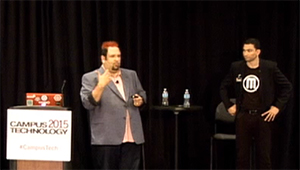Xavier U to Launch 3D Printing as a Service

Xavier's Shawn Nason (left) and Makerbot's Jordan Brehove (right) at Campus Technology 2015
In three months, Xavier University in Ohio expects to open a new business venture that it hopes will be a trailblazer for institutions of higher education. The business will merge state-of-the-art technologies in 3D printing, cutting-edge ideas born out of business innovation and a large dose of good-fashioned capitalism.
The effort will be "Xavier 3D printing.com" — basically an online retail version of the university's current Center for Innovation, a facility that combines 3D printing with consulting, mentoring and other services focused on innovation and entrepreneurship.
Do you have a challenging design or manufacturing project that is too difficult, costly or time-consuming to create on your own? Are you convinced that 3D printing could solve your problem but you lack the resources? No worries. The new Xavier 3D printing.com service will "print it for you overnight and mail it to you," boasted Shawn Nason, chief innovation officer at Xavier.
Speaking at the Campus Technology 2015 conference in Boston, Nason shared the stage with Jordan Brehove, vice president of professional services at MakerBot. Located in New York, MakerBot specializes in 3D printing and offers the MakerBot Innovation Center, a centralized 3D solution that includes hardware, software, services and support. While 3D printing technology has been around for a while — about 30 years — "it is only in the past two years that people could use it to scale," Brehove pointed out.
The Xavier Center for Innovation is utilizing that scale to support creativity both in the classroom and beyond campus borders. The idea to "go big" with 3D printing at the university first came about when Nason checked out the MakerBot booth at a conference last year and he liked what he saw. MakerBot representatives got together with Nason and his team to discuss how they could work together for mutual benefit: MakerBot wanted to pilot a new program to provide lots of 3D printers in an environment where there could be lots of potential uses for them, while the Center for Innovation wanted to take all its virtual ideas and digital projects and see them turn into reality.
Xavier soon became one of only four colleges or universities to feature a MakerBot 3D Printing Innovation Center as of this year. And with the purchase of 31 3D printers, Xavier has more of the devices than any other private institution in the country.
With all of that 3D printing power, Xavier is poised to solve any number of business, education or social challenges — while creating a whole new revenue stream along the way. Nason and Brehove described a number of projects that illustrate the capabilities of 3D printing, such as set design models, museum artifacts and children's prosthetics. But they were all small potatoes compared to their overall vision of 3D printing as nothing short of revolutionizing the educational experience for college students.
"My favorite work is disruption," Nason explained, and 3D printing has the potential to be a truly disruptive force in how students can take ideas and easily turn them into reality.
About the Author
David Weldon is a freelance education and technology writer in the Greater Boston area. He can be reached at [email protected].